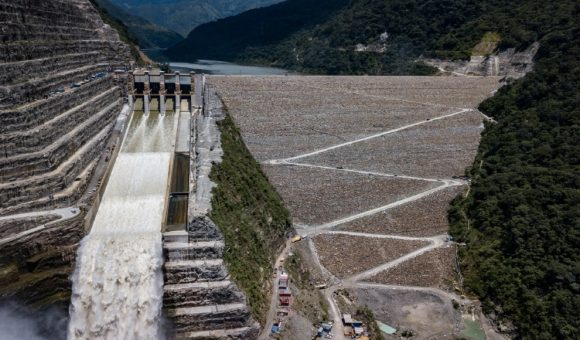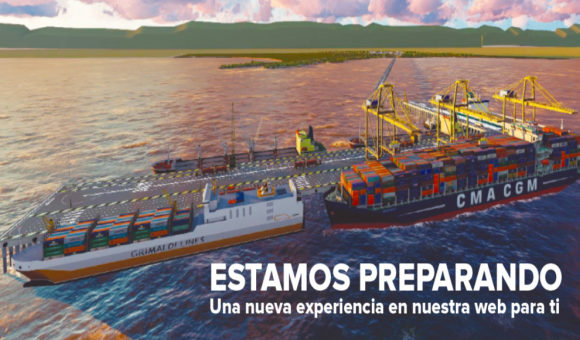Mar 1 financial close and Pacifico 1 2 3 ANI update March 2019

Antioquia’s Crucial ‘Mar 1’ Wins Financial Close; Puerto Antioquia Wins Concession; Pacifico 1-2-3 Making Progress
Colombia’s Vice President Marta Lucia Ramirez announced March 20 that the “Mar 1” highway project linking Medellin westward to Santa Fe de Antioquia — and eventually to new Atlantic ports — just won a COP$2.23 trillion (US$754 million) financial close organized by the “Financiera de Desarrollo Nacional” (FDN) financing agency.
On a related front, Vice President Ramirez simultaneously announced that the long-awaited “Puerto Antioquia” ocean freight port near Turbo, Antioquia, just won a 30-year concession.
That US$300 million port project will include construction of new piers and docking facilities for up to-five ocean ships simultaneously; a four-lane divided highway linking the dock area to terminal facilities; and onward highway linkages to the new “Mar 1” and Mar 2” highways that should be completed over the next six years — hence bringing Medellin much closer to relatively lower-cost global freight transport.
The new port will handle containerized cargo, highway vehicles, grains, plantains and bananas, according to project developer PIO Sas, in association with global shipping and port-operator Naviera Francesa CMA CGM S.A., plus major regional banana growers.
Civil works on the project will be undertaken by France-based Eiffage Infraestructuras de Francia along wth Colombia-based Termotecnica Coindustrial.
As for the “Mar 1” financial partners, these include Blackrock; the Interamerican Development Bank (IBD) and IBD Invest; CAF; ICO; the German Development Bank (KFW); Sumitomo Mitsui Banking; and France-based Société Générale
Mar 1 includes rehabilitation and operation of existing highway between Santa Fe de Antioquia and Peñalisa (71 kilometers); construction and operation of a second lane between Medellín and Santa Fe de Antioquia (43 kilometers); the construction and operation of a 4.6-kilometers-long, parallel tunnel (adjacent to the existing Tunnel de Occidente) linking Medellin westward toward Santa Fe de Antioquia; and the construction of 46 bridges.
Once completed, Mar 1 (and the connecting “Mar 2” project) will enable Medellin freight shippers and Colombian coffee exporters to tap a much quicker route to Atlantic ports in the Urabá region of Antioquia.
Today, vehicle transport from Medellín to Necoclí on the Atlantic ocean takes eight hours. But once Mar 1 and Mar 2 are complete, then transport time will be cut to four hours, according to Colombia’s Agencia Nacional de Infraestructura (ANI).
Construction companies in the Mar 1 project include Austria-based Strabag and its Swiss-based subsididary Strabag AG Switzerland (with 37.5% share); Sacyr (Sacyr Concessions Colombia and Sacyr Concesiones S.L.) with 37.5%, and Colombia-based Concay, S.A. with 25%.
Pacifico 1-2-3 Projects
On a related front, ANI president Louis Kleyn announced earlier this month that the 293-kilometers-long Pacifico 1-2-3 highways linking Medellin to other highways connecting to the Pacific port of Buenaventura continue to make progress — although completion on “Pacifico 1” between Medellin and Bolombolo isn’t likely until around 2023.
Currently, freight trucks face a grueling, 15-hour-journey to-and-from Medellin to Buenaventura. But the new Pacifico highways would cut that to 10 hours, according to ANI.
Linking Medellin to the Pacific region on modern, four-lane highways — including many new tunnels and bridges — will generate “more international trade from the green mountains that connect southwest Antioquia and the coffee region,” according to ANI.
“The progress in the construction of this great corridor is the result of rigorous and disciplined management in social, environmental, property and contract areas, [along with] confidence generated by banks and investors, both domestic and foreign,” according to the agency.
“To date, Pacífico 1 — the corridor connecting Bolombolo with La Primavera [Medelliin suburb of Caldas] has an execution of 15%, while Pacífico 2 (connecting Bolombolo to La Pintada) has achieved 64% execution, and Pacífico 3 (La Pintada to La Virginia in Risaralda) has advanced by 54%. These three projects total 119 fronts of active works,” according to ANI.
The works will efficiently connect the centers of inputs and production in the north of the country with the coffee zone, the Valle del Cauca and the Pacific Ocean, will benefit the producers and merchants of the departments of Magdalena, Atlántico, Bolívar, Córdoba, Sucre and Antioquia, in the decrease of travel times.
The department of Antioquia has 1,530 km of national road network, it has a strategic location, not only because of its size, but also because of the maritime and fluvial limits and especially the proximity to rivers such as Cauca and Atrato. Therefore, the 4G tracks that are built and those that will cross it are fundamental for the region, since they will promote social progress and become bridges of international trade.
Currently, the travel time of a truck loaded with cargo from Medellín to Buenaventura can take 15 hours, but with the construction of these projects it will be reduced to 10 hours. The time between Manizales and Medellín will also be reduced, from 4 hours and a half to 2 and a half hours, and from the municipality of La Virginia, in Risaralda, to Medellín, it will go from 5 hours 30 minutes to 2 hours 40 minutes, on average.
















